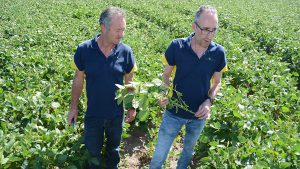GrainTALK for October 2018
AN UPDATE ON GRAIN FARMERS OF ONTARIO NEWS AND EVENTS
| FROM THE CHAIR A Q&A with Grain Farmers of Ontario chair, Markus Haerle.  Grain Farmers of Ontario recently joined Grain Growers of Canada. Why did we do so, and why is it important for us to be a part of this national organization? We had been looking for a national voice for the grains and oilseed industry to be established. Grain Growers of Canada had some of the structure that we were looking for, but they needed to be a bit more focused on how they approach and handle issues brought forward by the provincial associations that make up their organization. A recent rejuvenation led to our organization, Les Producteurs de grains du Québec, Saskatchewan Pulse Growers, and the Manitoba Oat Growers’ Association joining Grain Growers of Canada — making them a truly national voice in Ottawa. During the Grain Growers of Canada AGM, I was honoured to be elected as vice-chair. This will give us, as Ontario, another way to bring our issues forward and have representation within a body that is going to work at the national level to promote the grains and oilseed industry. At a time when grain farmers are increasingly challenged by trade volatility, policy priorities for GGC include expanded international trade, the successful implementation of the Transportation Modernization Act, the PMRA review process of chemicals, and a comprehensive review of Business Risk Management programming that delivers programs that work for farmers. |
ANNUAL DISTRICT MEETINGS
Grain Farmers of Ontario is beginning to plan for the 2018 January District Grain Committee Meetings. Be sure to check our website, www.gfo.ca, for updates to the date and location of your district’s meeting. Details will also be published in the GrainTALK Newsletter in upcoming issues of the Ontario Grain Farmer magazine as they are finalized.
The Annual District Meetings are called to elect voting delegates and directors for the coming year. Updates on the organization and grain industry issues are also provided at these meetings. All barley, corn, oat, soybean, and wheat farmers are welcome and encouraged to attend. •
GRAIN FARMERS OF ONTARIO ANNUAL REPORT
If you were unable to make it to Grain Farmers of Ontario’s Annual General Meeting in September, the Annual Report is available online at www.gfo.ca or by calling the office at 1-800-265-0550 and requesting a copy be mailed to you. •
REMINDER: SOYBEAN DRYING CHARGES
Soybean producers are reminded about the need to confirm drying charges which are now calculated under the Agreement for Marketing the Ontario Soybean Crop made under the Farm Products Marketing Act (O.Reg 485/09).
Soybean drying charges are no longer tied to the price of soybeans. Cleaning and handling charges, as well as soybean drying charges/moisture discounts, are agreed upon by the dealer and the producer through competitive market forces, similar to the corn and wheat markets.
Producers should confirm all terms and conditions with their buyer before making their deliveries. •
WHEAT HARVEST QUALITY
Ontario’s 2018 harvested winter wheat crop came off with excellent quality this year. Dry weather during June and good weather during harvest resulted in very little sprout damage and no Fusarium. All winter wheat classes had higher protein levels relative to last year, with each class approximately one per cent higher over last year’s values. Grade 1 and 2 were predominant across all the classes with strong test weights.
Please visit http://gfo.ca/production/ontario-wheat-quality/ to find detailed results from across the province. •
PROVINCIAL PREMISES REGISTRY
Premises identification is the first step in establishing a traceability system that can lead to business advantages, including improved operational efficiencies and increased market access. Outbreaks, recalls, or other agri-food incidents can be time consuming and costly. With the Provincial Premises Registry (PPR), the government can notify you about incidents that may impact you and your operation quickly, minimizing the effect on your operation.
The Provincial Premises Registry is a record of individual parcels of land associated with agri-food activities. Governments can use the information to provide swift response to incidents that could impact agri-food businesses, such as weather disasters, animal or plant disease outbreaks, or contaminated food. Agricorp operates the registry on behalf of the Ontario Ministry of Agriculture, Food and Rural Affairs (OMAFRA).
The integrity of the PPR depends on accurate and current premises information. Registrants are encouraged to confirm or update their premises information annually. This creates a competitive market advantage for your product and helps protect your business in the event of an agri-food incident. Confirming your premises information at least every two years also keeps your premises ID active and eligible for government programs, such as Ontario’s Risk Management Program.
To update your information or register a new premises, visit www.ontariopid.com or call Agricorp at 1-888-247-4999. •
WOMEN IN GRAINS
Grain Farmers of Ontario held its first Women in Grains Business Management program in conjunction with Agri-food Management Institute (AMI) in August. The two part program took place on August 21 and August 28. Twenty-five farmer members attended the sessions. The first session featured business strategies and farm financial analysis with Rob Hannam of Synthesis Agri-food Network, and Donna Archer of Maizeing Acres Inc. The second session focused on how to set up a marketing plan and what your financial statements are telling you about the health of your business. •
WOMENS’ GRAIN SYMPOSIUM
The second annual Womens’ Grain Symposium will take place on November 7 – 8, 2018 at the Delta Hotel in Guelph. The 1.5 day conference will include topics covering: leadership, social media and branding, networking, mental health, and consumer outreach. There will also be a panel discussion where attendees will learn from the experiences of other women in agriculture. This is a great networking opportunity to meet with other women working in the grain industry and meet with speakers. If you are interested in being involved in this event, please reach out to Steve McCabe, manager of member relations, at smccabe@gfo.ca or 226-979-5581. •
AJAC AUTOMOTIVE INDUSTRY CONFERENCE
As part of our ethanol and bio-diesel education and promotion, Grain Farmers of Ontario will exhibit at the AJAC Automotive Industry Conference for the first time. The AJAC (Automotive Journalist Association of Canada) event draws more than 100 auto media and an additional 50 auto industry attendees from across the country.
The Grain Farmers of Ontario exhibit will highlight the benefits of bio-fuels for performance, the environment, and cost. The team will connect with auto media and start building out relationships with key Canadian influencers. This is a great opportunity to gauge the interest of auto media in bio-fuels stories and to hear their questions about Ontario corn and soybeans.
In addition to exhibit space, Grain Farmers of Ontario will be recognized as a sponsor to all AJAC members and our sponsorship will be promoted by AJAC on social channels and in their newsletter. •
HAVE YOU NOTICED A DIFFERENCE?
The Ontario Grain Farmer magazine has a fresh new look!
We’ve updated the layout and design to better reflect its association with Grain Farmers of Ontario. The magazine is a publication of Grain Farmers of Ontario designed to update farmer-members on the latest activities of the association, industry news, and agronomic information.
If you have any questions or comments about our new look – feel free to contact us!
Rachel Telford, managing editor, rtelford@gfo.ca or 519-837-9144. •
MARKET COMMENTARY
by Philip Shaw
As we move into October, harvest will surely be wrapping up all across Ontario. The story of this year is huge crops in the United States and the devastating effect of the trade war between the United States and China. These two factors have combined to bring soybean prices down to the lowest point in nine years, which has also negatively impacted corn and wheat futures prices.
Ontario basis levels have actually held up well with the lower grain futures values supported by a low Canadian dollar fluttering in the 75 to 76 cent U.S. level. As we moved into harvest, these basis values were under pressure as the Ontario crop is a very good one. •


























